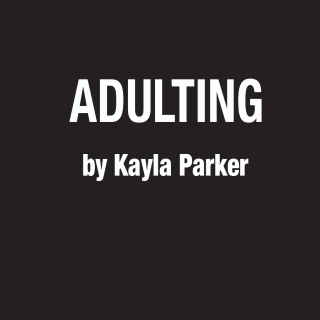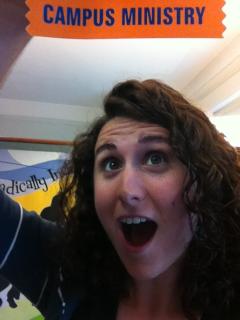Adulting is Hard – by Kayla Parker
By Ted Resnikoff
Adulting Is Hard
by Kayla ParkerWhen I was twenty-five, I started graduate school and my Dad had a stroke. Doctors told us he should have died. He is still alive, though forever changed.
When I was twenty-six, my ex came out as trans and I felt awful because I thought if I had been more supportive he might have come out earlier. That same year, the Black Lives Matter movement called on me to face my white privilege with an urgency I had never felt before, and continues to do so today.
When I was twenty-seven, one of my best friends successfully fought off an attempted assault by a stranger who broke into her apartment and bedroom. That same year, my other best friend changed his last name to his birth mother’s, to recognize her and his Afro-Latinx heritage. He reassured his white (adoptive) parents that he was not rejecting them, just accepting himself.
And this is just what I feel okay sharing with people I don’t know on the Internet.
Being an adult is really hard.Being an adult is hard, and “adulting”—a word that many now use to mean the difficulty of paying bills and making our own food—doesn’t begin to describe it. Being an adult is hard for reasons far beyond increased responsibilities and growing to-do lists.
Life gets harder because we get hurt and hurt others. Life gets harder because people we love die and suffer. Life gets harder because we have to find and make our own way. Life gets harder because it is hard.One of the hardest things is that we have few guides in this increasingly complex and difficult time in our lives.
Though so much of the wisdom passed down from our ancestors still guides us, in so many ways our world seems drastically distinct from that of our parents and grandparents. My parents never questioned the gender binary, and it wasn’t until after WWII that adoption became a transnational market. Globalization has expanded our interconnectedness and worldview—and oppressive systems within this web of connection are being exposed by many voices in a variety of public forums. From the Arab Spring to Black Lives Matter, the status quo is being challenged in ways that seem historically familiar yet distinct.
Social media has enabled so many of us to share our opinions and organize for change. Our interconnectedness, with all its harm and beauty, is becoming more apparent. We are living in a world that is waking up to its pluralistic, ambiguous, and painful reality.
And it can be loud. Amid all the voices of pain and love, I can sometimes lose my sense of direction and need help getting re-oriented. Like falling into that black hole of scrolling on Facebook, it is easy to become so immersed in individual stories that we lose sight of how they’re connected. The bigger picture can fade away.
Surrounded by so many voices, it can be hard to find guides for navigating our ever-changing world. I’m incredibly grateful to have found one in a faith tradition that is both ancient and modern. I am a Unitarian Universalist, a religion that was born in the liberal Christian tradition, but which has evolved into a pluralistic faith that accepts a variety of religious beliefs. We are a community of people exploring our own paths to truth while learning from each other and holding one another accountable. We are a community of people who know the world is complex and ambiguous, and we wade bravely into it together.
Something that got me through my mid-twenties without feeling so alone was working on a book published by a Unitarian Universalist imprint, Skinner House Books, called Becoming: A Spiritual Guide for Navigating Adulthood. I spent nights pouring over readings and prayers, both ancient and modern, from writers who are Unitarian Universalist, “spiritual but not religious,” atheist, and from a variety of faith traditions. I collected reflections written by other young adults who had struggles and successes that were both similar to and different from my own. Through their words, I found meaning, hope, and guidance. I found company. I felt less alone and more ready to face this complex, heart-breaking world. That little book became a friend I could carry with me everywhere and call on at any hour.
Perhaps this book—or this faith—can help you too. Or maybe other words, people, communities, or traditions can. Wherever and whatever it is, I hope that you are able to find company and guidance that can support you in your becoming.
Kayla Parker is the Contract Minister at the Unitarian Universalist Congregation of Charleston, WV and a recent graduate of Yale Divinity School. She previously served as Campus Ministry Associate for the Unitarian Universalist Association and is the editor of Becoming: A Spiritual Guide for Navigating Adulthood, available from Amazon.com and wherever books are sold. For more information about Unitarian Universalism, visit uua.org/beliefs.

